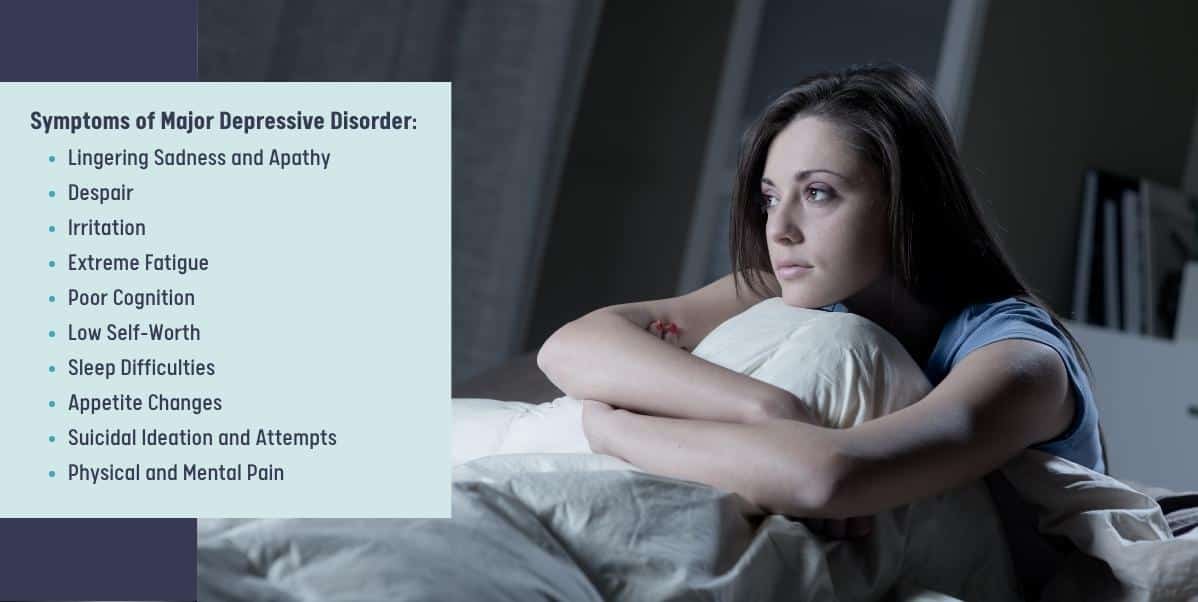
It is common to hear people say they are depressed or going through the blues when they are experiencing a rough patch in life. However, they bounce back and move on with life when the season ends. Contrary to popular belief, occasional sadness is not depression. It is a healthy human emotion that everybody experiences in life.
On the other hand, depression is not an emotion. It is a disorder characterized by a negative mood, feelings, and thoughts. It is more complex than periodic sadness, which resolves with positive thinking, resolution, and environment.
What is Depression?
Depression is a psychological disorder presented by a lack of interest and lingering sadness. It occurs as a spectrum of conditions with varying severity degrees. The fifth edition of the diagnostic Statistical Manual of Mental Disorders (DSM-V) lists eight types of depression.
- Major depressive disorder (MDD) or clinical depression – a positive diagnosis for MDD requires at least two weeks of experiencing unrelenting sadness and apathy. At least five other symptoms of depression should co-occur with these two primary main symptoms. MDD is a severe form of depression. It is also what people mean when they say they are depressed.
- Premenstrual dysphoric disorder – begins a few days before a person’s menstrual cycle. Signs of this condition include premenstrual syndrome (PMS) symptoms like bloating, belly pain, anxiety, headaches, and breast tenderness. PMS occurs with other depressive symptoms like a negative mindset and extreme irritation.
- Substance/medication-induced depressive disorder – Certain medications and alcohol and drug abuse can also induce a depressive mood.
- Depressive disorder due to another medical condition – depression can come from other medical conditions like hypothyroidism, Parkinson’s disease, and heart disease.
- Persistent depressive disorder – is a mild form of depression that persists for at least two years. It was previously called dysthymia.
- Disruptive mood dysregulation disorder (DMDD) – is a depressive disorder subtype experienced first in children from the age of 10. The child exhibits frequent anger outbursts and irritability.
- Other specified depressive disorders – there are forms of depression that occur at specific periods, like seasonal affective disorder (SAD), a depressive disorder that begins at the change of a season. Another form of this depression is prenatal and postpartum depression which occurs during and after pregnancy.
- Unspecified depressive disorder – when someone has an episode of depression with severe symptoms, but the condition’s progression does not follow any stipulated requirements for a depression diagnosis.
The recognized depressive disorder symptoms are severe enough to interfere with daily living. Being alive becomes pointless and a burden. Thus, MDD is much worse than what people erroneously consider occasional depression. It is a disorder that requires medical intervention.
Symptoms of Major Depressive Disorder
MDD affects a person’s thoughts, feelings, perception of life, and desire to live. The signs of this disorder include:
Lingering Sadness and Apathy
Depression causes a type of dismay that does not resolve, even in a positive environment or in the presence of friends and loved ones. Anxiety, feelings of gloom and doom, and an intense feeling of emptiness accompany sadness.
Despair
Hopelessness breeds in an atmosphere of negative moods, emotions, thoughts, perceptions, and life events. It also evokes a sense of helplessness and extreme pessimism.
Irritation
The frustration of having to move on with life despite being disinterested, unmotivated, and despondent is annoying. It leaves the person restless, agitated, and angry even on small matters.
Extreme Fatigue
The depressive mood affects part of the brain responsible for alertness, motivation, and wakefulness. Therefore, the person becomes tired even after resting or a full night’s sleep. The body never slows down to heal and rejuvenate because the person never gets to experience restful slumber.
Poor Cognition
A person with MDD also has difficulty concentrating. Their mind shifts attention to stressors – the troubles plaguing their mind, persistent negative thinking, and hypervigilance. The inability to rest also diminishes their cognitive function. It becomes impossible to make decisions, remember, or memorize things.
The person exhibits decreased energy. They do things slowly and without any sense of urgency.
Low Self-Worth
A negative mindset impacts self-perception. A person feels like a burden and worthless. Self-pity begets resentment, shame, guilt, and misery. It pushes the individual to isolate and brood over their insecurities.
Sleep Difficulties
MDD can cause either sleep deprivation or oversleeping. Insomnia robs a person’s ability to fall or stay asleep even though they have been awake all night. However, the body and mind act tired despite the wakeful state. On the other hand, a person may become sleepy, even after a full night’s rest. However, that sleep quality is low because it is not a restful slumber.
Appetite Changes
Depression can suppress or augment a person’s appetite. The reason behind the variation is genetic. In appetite suppression, it becomes impossible to desire or keep food in the stomach. The person feels nauseated or gets the urge to have diarrhea in the presence of food. They may even get an upset stomach at the thought of food. Weight loss, hyperacidity, ulcers in the digestive system, and bowel irritability accompany appetite suppression.
At the other end of the pendulum, depression can push a person to binge eat. When despair kicks in and the stress response gets activated, the person eats their feelings away. The hunger and satiety center becomes unresponsive during such times. Constant eating causes extreme weight gain eventually.
Suicidal Ideation and Attempts
The mental anguish and misery of depression push people into thinking about suicide to end their pain. It may start as self-harming to release the tension. Eventually, the deliberate cutting, biting, bruising, or hitting turns into a planned overdose, car crash, or fatal gunshot wounds.
Physical and Mental Pain
Depression causes physical aches. The depressed individual experiences muscle cramps because of prolonged periods in the fight-or-flight state. Digestive discomforts from hyperacidity, ulcerations, and inflammation also cause severe distress. Headaches from persistent rumination and hypervigilance are equally painful.
Treat MDD with TMS Therapy
TMS therapy is an exciting, cutting-edge treatment option for those who suffer from major depressive disorder. It is a safe, non-invasive form of therapy that works by delivering magnetic pulses to the brain. Unlike traditional medications, which can have unpleasant side effects or take weeks to start working, TMS is able to start working quickly, often within days.
Research has consistently shown that TMS is effective in reducing depression symptoms and improving quality of life. Additionally, because it is non-invasive and convenient (it can be done in a doctor’s office), it offers a relatively low-risk alternative to medications or psychotherapy for those suffering from depression. For more information on how to get started with TMS Therapy, contact My TMS Therapy by filling out our contact form or calling (877) 548-8081.



